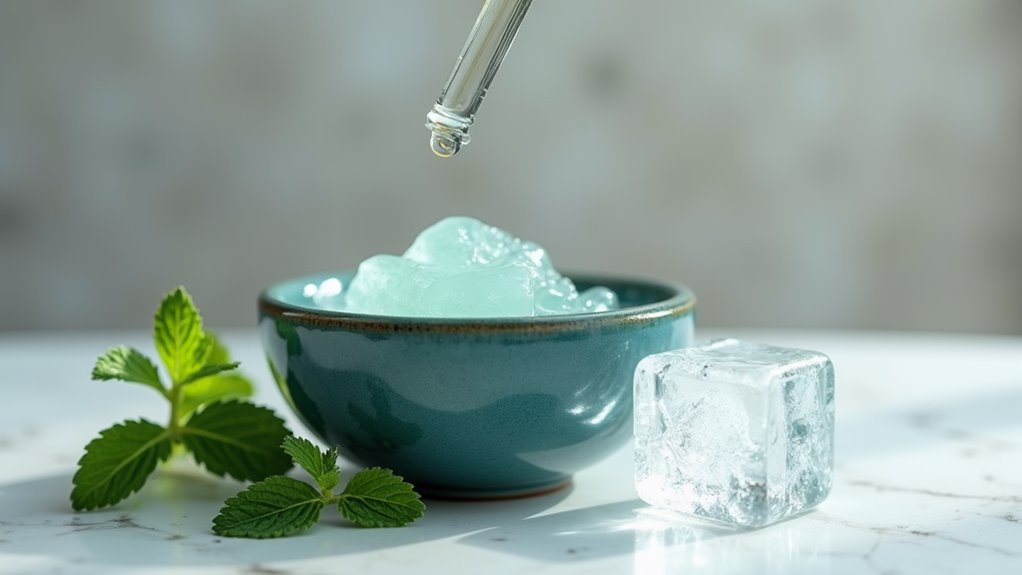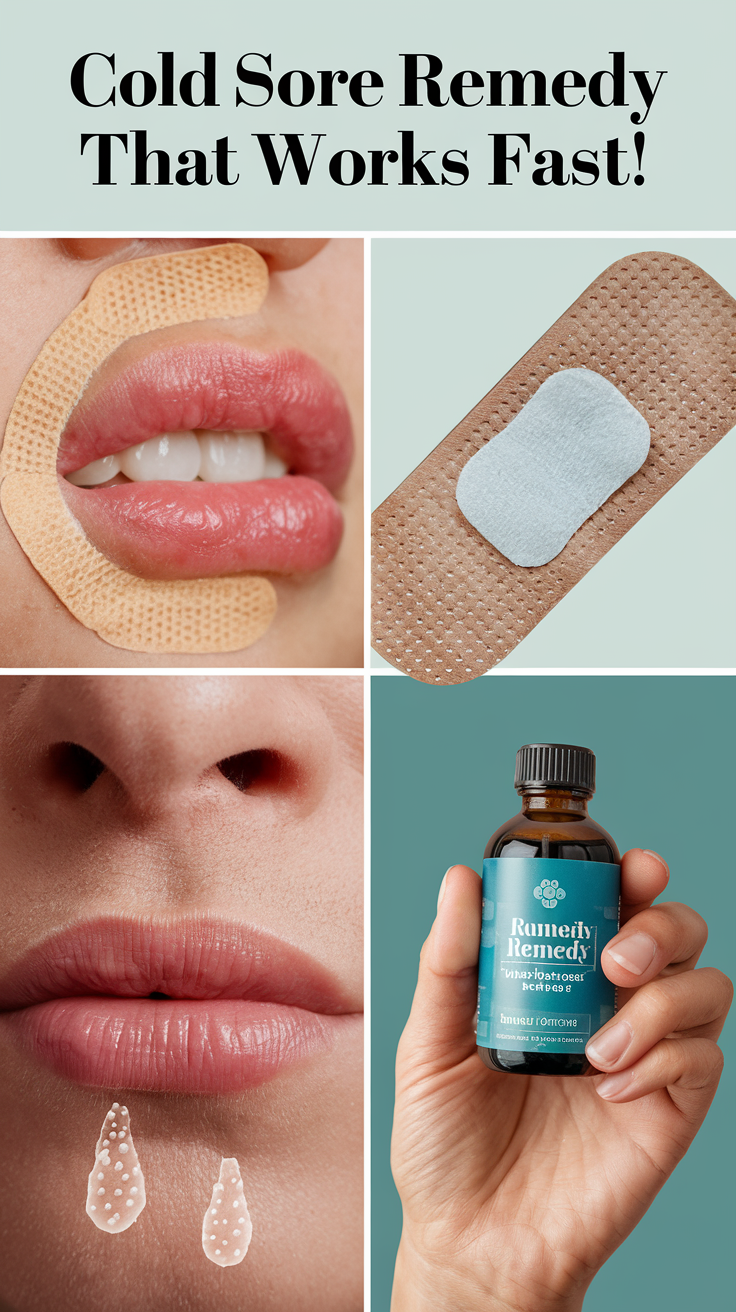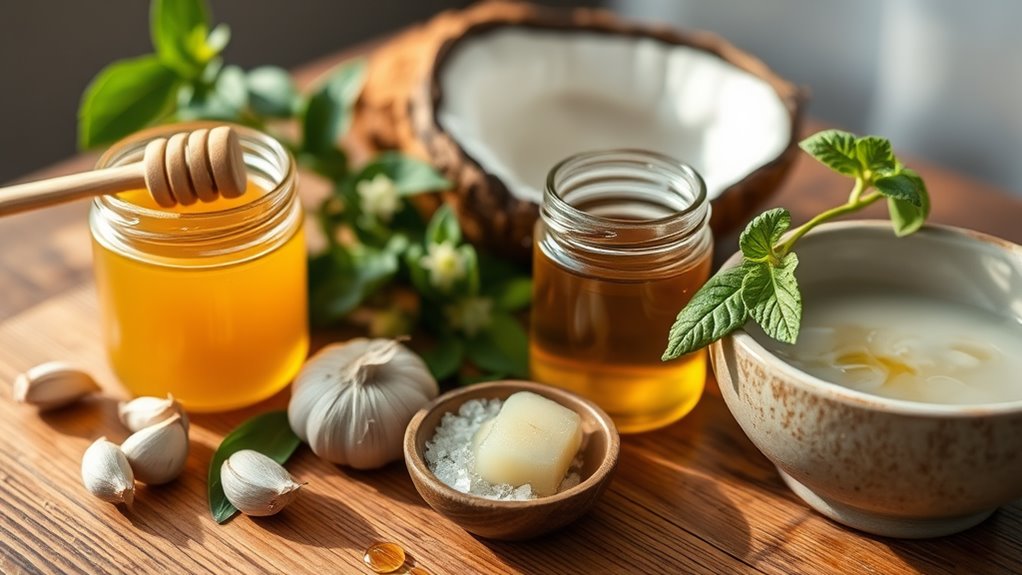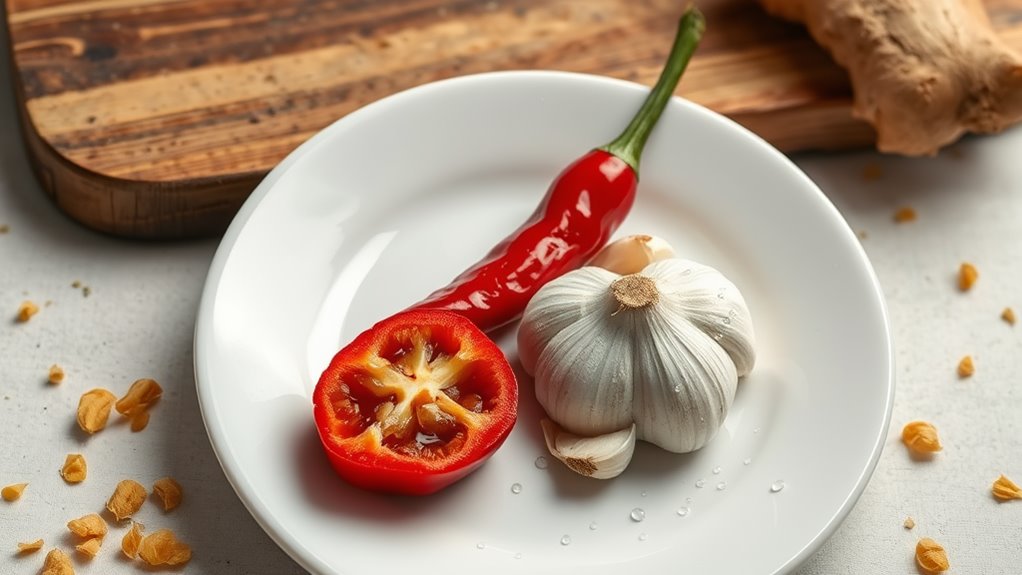Cold Sore Remedy That Works Fast!
You can stop a cold sore quickly by taking immediate action at the first sign of tingling. Apply an over-the-counter antiviral cream like docosanol and take oral pain relievers to ease discomfort. For fastest results, contact your doctor for prescription antivirals like Valtrex, which can greatly reduce healing time when started early. In the meantime, apply ice wrapped in cloth and use zinc oxide cream. Discover proven natural remedies and prevention strategies to keep future outbreaks at bay.
Key Takeaways
-
Apply antiviral creams containing docosanol at first sign of tingling to block virus entry and speed healing time.
-
Take prescription antivirals like Valtrex immediately when symptoms begin for noticeable improvement within 24-48 hours.
-
Use ice wrapped in cloth directly on affected area to reduce swelling and provide immediate relief.
-
Apply honey to the cold sore several times daily to promote faster healing and natural antiviral effects.
-
Combine over-the-counter pain-relieving gels containing lidocaine with cold compresses for quick comfort and reduced discomfort.
Understanding Cold Sores and Their Causes
While many people mistake cold sores for regular acne, they’re actually small fluid-filled blisters caused by the herpes simplex virus type 1 (HSV-1). You’re not alone if you experience these painful sores, as they affect millions of people worldwide.
When you’re stressed, sick, or exposed to triggers like sunlight and hormonal changes, the dormant virus can reactivate and cause an outbreak.
Understanding what triggers your cold sores is essential for finding effective cold sores remedies. You’ll typically notice tingling or burning before the blister appears, which is your warning sign to start treatment.
The virus spreads through direct contact, so you’ll want to avoid touching the sore and sharing personal items during an outbreak.
Early Warning Signs of a Cold Sore Outbreak
When you learn to recognize the early warning signs of a cold sore, you can start treatment sooner and potentially minimize the outbreak’s severity.
Most people experience a tingling, itching, or burning sensation around their lips 24-48 hours before the blister appears. This is called the prodrome stage.
You might also notice that the affected area feels tight, sensitive, or slightly swollen. Some people experience mild pain or a pins-and-needles sensation.
Other warning signs include redness in the area and unusual dryness or flaking of the skin.
If you’re feeling run down, stressed, or notice your lymph nodes are swollen, these could be additional indicators that a cold sore is developing.
Many cold sore sufferers also report feeling a mild headache or general fatigue before an outbreak.
The Science Behind Cold Sore Development
Cold sores develop because of the herpes simplex virus type 1 (HSV-1), which lies dormant in your nerve cells until triggered by stress, illness, or environmental factors.
When activated, the virus travels along your nerve pathways to your skin’s surface, causing those familiar tingling sensations and eventual blisters.
Your body’s immune system immediately begins fighting the outbreak by sending white blood cells to the affected area.
This immune response causes inflammation and the formation of fluid-filled blisters.
As you progress through the stages, the blisters will break, form a crust, and eventually heal.
While you can’t eliminate HSV-1 from your system, you’re not alone – about 67% of people worldwide carry this virus, and understanding its lifecycle helps you better manage outbreaks.
Essential Over-the-Counter Treatments
Several effective over-the-counter treatments can help manage cold sore symptoms and speed up healing time.
You’ll find antiviral creams containing docosanol (Abreva), which blocks the virus from entering healthy cells. Apply it at the first tingle for best results.
Pain-relieving gels with benzyl alcohol or lidocaine can ease discomfort and burning sensations.
You’ll also want to try zinc oxide or zinc sulfate creams, which many cold sore sufferers find helpful in reducing outbreak duration.
Don’t forget about lip balms with sunscreen – they’re essential for preventing UV-triggered outbreaks.
For comfort, try applying a cold compress or take an oral pain reliever like ibuprofen.
Prescription Medications for Fast Relief
Looking for stronger relief from stubborn cold sores? Your doctor can prescribe antiviral medications that work faster than over-the-counter options.
Popular prescriptions like Valtrex, Famvir, and Zovirax target the herpes simplex virus directly, reducing both healing time and pain.
You’ll get the best results if you start these medications at the first sign of tingling. Most patients notice significant improvement within 24-48 hours when taking oral antivirals.
Your doctor might also prescribe a topical antiviral cream to use alongside oral medication for enhanced effectiveness.
Natural Remedies From Your Kitchen
For those seeking gentler alternatives to medication, many effective cold sore treatments can be found right in your kitchen cabinets. Common household items like honey, lemon balm, and peppermint oil contain natural antiviral properties that can help fight the herpes simplex virus.
You’ll find that applying raw honey directly to your cold sore creates a barrier that promotes healing while reducing pain and inflammation.
A cool tea bag compress made with either green or black tea provides tannic acid that may speed up recovery. You can also try crushing a vitamin C tablet into a paste with water and applying it to the affected area – the ascorbic acid helps boost your immune response.
Even plain ice wrapped in a thin cloth can provide immediate relief by reducing swelling and discomfort.
Healing Properties of Essential Oils
Essential oils offer potent natural relief for cold sores through their antiviral and anti-inflammatory properties.
You’ll find tea tree oil particularly effective, as it fights the herpes simplex virus while reducing painful swelling. Simply dilute it with a carrier oil and apply directly to your cold sore.
Peppermint oil’s cooling effect helps ease discomfort, while its antiviral compounds speed up healing time.
Lavender oil soothes irritation and reduces stress, which can trigger outbreaks. You can also try eucalyptus oil for its powerful antimicrobial benefits.
To create your own healing blend, mix 2-3 drops each of tea tree and lavender oils with a tablespoon of coconut oil.
Apply this mixture to your cold sore 3-4 times daily using a clean cotton swab. You’ll notice improvement within 24 hours.
Cold Sore Treatment Timeline
While cold sores typically heal on their own within 10-14 days, proper treatment can greatly reduce both healing time and discomfort.
You’ll notice the first signs of a cold sore when you feel tingling or burning – this is your cue to start treatment immediately.
During days 1-2, you’ll see small blisters forming. Apply your chosen treatment frequently.
By days 3-4, the blisters will burst and form painful sores. Keep the area clean and continue treatment.
Around days 5-8, scabs will develop – don’t pick them!
By days 9-10, you’ll notice the scab falling off naturally, revealing new skin underneath.
With consistent treatment, you’ll heal faster and be ready to show off your smile again.
Proven Pain Management Techniques
Managing cold sore pain effectively requires a multi-pronged approach that combines both over-the-counter and natural remedies. You’ll find relief by using these proven techniques that many cold sore sufferers rely on daily.
| Pain Management Method | How It Works |
|---|---|
| Ice Pack Application | Numbs the area and reduces inflammation |
| OTC Pain Relievers | Reduces pain and fever symptoms |
| Lip Balm with SPF | Prevents burning and cracking |
| Benzyl Alcohol | Provides temporary numbing relief |
For immediate comfort, apply an ice pack wrapped in a thin cloth to the affected area for 10 minutes. When you’re on the go, keep benzyl alcohol wipes handy for quick pain relief. Don’t forget to take ibuprofen or acetaminophen to manage both pain and swelling throughout your day.
Diet Changes That Speed Up Recovery
Beyond pain management techniques, your diet plays a powerful role in healing cold sores faster.
You’ll want to boost your lysine intake by eating foods like yogurt, fish, chicken, and cheese while limiting arginine-rich foods such as chocolate, nuts, and seeds. This amino acid balance helps prevent viral replication.
Load up on immune-boosting foods rich in vitamin C and zinc.
Citrus fruits, berries, leafy greens, and bell peppers will support your body’s natural defenses.
Don’t forget to stay hydrated by drinking plenty of water throughout the day.
You might also consider adding probiotic-rich foods like kefir and sauerkraut to strengthen your gut health, which directly impacts your immune system’s ability to fight off the virus.
Stress Reduction Strategies for Prevention
Since stress can trigger cold sore outbreaks, developing effective coping strategies is essential for prevention.
You’ll want to incorporate meditation, deep breathing exercises, or gentle yoga into your daily routine – even 10 minutes can make a difference. Regular exercise releases endorphins that combat stress, so try to move your body for at least 30 minutes each day.
When you’re feeling overwhelmed, reach out to friends or family members who understand what you’re going through. They can provide emotional support and helpful distractions.
Consider joining a stress management group or downloading a mindfulness app to stay on track. Getting enough sleep, maintaining work-life balance, and setting realistic expectations for yourself will also help keep your stress levels – and cold sores – under control.
Lifestyle Adjustments to Minimize Outbreaks
To keep cold sore outbreaks at bay, you’ll need to make several key lifestyle changes. Start by getting enough sleep – aim for 7-9 hours nightly to keep your immune system strong.
You’ll also want to protect your lips from harsh weather by using SPF lip balm and avoiding excessive sun exposure.
Watch what you eat, too. Foods high in lysine, like yogurt and fish, can help prevent outbreaks, while foods high in arginine, like nuts and chocolate, might trigger them.
Don’t share personal items like lip products or towels with others, even if they don’t have visible sores.
Stay hydrated by drinking plenty of water, and maintain a consistent exercise routine to boost your immunity.
If you’re prone to cold sores, you’ll also want to avoid intimate contact during active outbreaks.
When to Seek Medical Attention
While lifestyle changes can help prevent cold sores, you’ll need to recognize when professional medical care becomes necessary. If you’re experiencing severe symptoms or unusual complications, don’t hesitate to contact your healthcare provider.
| Warning Signs | Action Required |
|---|---|
| Fever over 102°F | Seek immediate care |
| Eye involvement | Visit doctor within 24 hours |
| Spreading rash | Schedule appointment |
| Severe pain | Get medical evaluation |
| Weakened immunity | Consult specialist |
You’re not alone in dealing with cold sores, and getting proper medical attention when needed is vital for your health. If you’re pregnant, have frequent outbreaks, or your sores last longer than two weeks, it’s time to see a doctor. Some situations may require prescription antivirals or specialized treatment to prevent serious complications.
Protecting Others During an Outbreak
Because cold sores are highly contagious, you’ll need to take extra precautions to protect those around you during an outbreak.
Don’t kiss anyone or engage in intimate contact until your sore has completely healed. Avoid sharing items that touch your mouth, including drinking glasses, eating utensils, lip products, or towels.
Keep your hands clean by washing them frequently, especially after touching your cold sore.
If you live with others, use separate pillowcases and towels until the outbreak clears. Be particularly careful around newborns, elderly people, or those with weakened immune systems, as they’re more vulnerable to complications.
When you’re at work or social gatherings, avoid touching your face and maintain good hygiene practices to protect your friends, family, and colleagues.
Strengthening Your Immune System
Since a strong immune system can help prevent cold sore outbreaks, it’s essential to maintain healthy lifestyle habits.
You’ll want to get 7-9 hours of quality sleep each night and manage your stress through meditation, yoga, or deep breathing exercises. Regular physical activity boosts your immune function, so aim for at least 30 minutes of exercise most days.
Make sure you’re eating a balanced diet rich in immune-supporting nutrients. Include plenty of vitamin C from citrus fruits, vitamin E from nuts and seeds, and zinc from lean meats and legumes.
Stay hydrated by drinking water throughout the day, and limit alcohol consumption. You might also consider taking a daily probiotic supplement to support your gut health, which plays a significant role in immune function.
Common Treatment Mistakes to Avoid
Although treating cold sores can be straightforward, many people make mistakes that slow down healing or worsen symptoms.
You’ll want to avoid these common errors that many of us make during outbreaks.
Don’t pop or pick at your cold sore, as this spreads the virus and delays healing.
Resist using toothpaste as a home remedy – it’s harsh and can irritate your skin.
You’re also better off avoiding acidic foods that can sting the sore and trigger more discomfort.
Another mistake is stopping treatment too soon.
Even when your cold sore looks better, continue applying medication for the full recommended time.
Also, don’t share items like lip balm or towels during an outbreak, as you’ll risk spreading the virus to others or reinfecting yourself.
Long-Term Prevention Strategies
While treating active cold sores is important, preventing future outbreaks should be your primary goal.
You’ll want to focus on strengthening your immune system through regular exercise, proper sleep, and stress management. Many cold sore sufferers find success by taking daily lysine supplements and maintaining a diet low in arginine.
You can join the many people who’ve reduced their outbreaks by identifying and avoiding their personal triggers. Common triggers include excessive sun exposure, hormonal changes, and certain foods.
Don’t forget to protect your lips with SPF balm year-round. If you’re experiencing frequent outbreaks, talk to your doctor about prescription antiviral medications for suppressive therapy.
Together with these strategies, you’ll be better equipped to prevent future cold sores.
Latest Research in Cold Sore Treatment
Recent studies have revealed promising developments in cold sore treatment, particularly in antiviral therapies and immune system modulation. You’ll be excited to learn that researchers have discovered new compounds that target the virus more effectively than traditional medications.
These breakthroughs include novel delivery methods that help medicine penetrate deeper into affected tissue. Scientists are also exploring gene therapy options that could prevent future outbreaks by modifying how your body responds to the herpes simplex virus.
They’ve identified specific proteins that may block the virus from replicating. Additionally, researchers are testing natural compounds like propolis and certain amino acids that show promise in reducing healing time and outbreak frequency.
You’ll soon have access to these innovative treatments as they complete clinical trials and receive approval.
Frequently Asked Questions
Can Cold Sores Spread to Other Parts of My Body While Sleeping?
Yes, you can spread cold sores to other areas by touching them and then touching different body parts. To prevent this, wash your hands frequently and avoid touching your sore while sleeping.
How Long After a Cold Sore Heals Is It Safe to Kiss?
You should wait at least 48-72 hours after your cold sore has completely healed. Even if you can’t see it anymore, don’t rush back to kissing until you’re sure it’s gone.
Do Cold Sores Always Appear in the Same Spot?
You’ll typically find cold sores returning to the same spot because the virus lies dormant in nearby nerve cells, but they can occasionally appear in different areas around your mouth.
Can Sunscreen Prevent Cold Sores From Developing During Sun Exposure?
Yes, you’ll find that sunscreen can help prevent cold sores from developing. Make sure you’re using SPF 30+ on your lips, as UV rays often trigger outbreaks in sun-sensitive people.
Why Do Some People Never Get Cold Sores Despite Exposure?
You’re among the lucky ones who’ve built natural immunity or haven’t inherited the HSV-1 virus. Your body’s strong immune system prevents the virus from triggering outbreaks after exposure.








